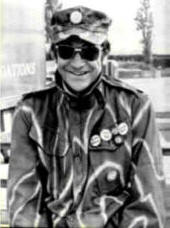
James Booth:
Exclusive Interview by Romany Bain
She Magazine, 11/1967, pp. 72-74

There was a certain amount of doubt in my mind as I walked through the quiet purlieus of York House, Twickenham, as to whether I would recognize the chap I had come to interview. Would he be disguised as Dr. Zhivago or D'Artagnan, Romeo or St. George?
I peered through the laurel bushes. Poised, rapier in hand, in front of a monumental three-tiered Victorian fountain, topped by a 10' Venus in her birthday suit and surrounded by eight supplicating bare-buttocked maidens, was a tall figure in lime tights and tangerine-plume titfer, in the act of running through a trio of plump, orange-clad musketeers. Each cried "Touche!" in turn, and collapsed into the lily pond.
It was James Booth, in one of the eight Walter Mitty-type disguises he assumes in Joseph Shaftel's light-hearted comedy The Bliss of Mrs. Blossom, directed by Joseph McGrath, in which he co-stars with Shirley MacLaine and Richard Attenborough. The dripping trio were those well-known zanies, the Alberts.
I escorted Jimmy back to his caravan dressing-room, where he removed his cloak, opened his lace-collared shirt to reveal a smashing hairy chest, ripped off his moustache, and tucked into ham and eggs.
"Can't eat or speak with the moustache on," he explained, and laughed, flexing his tacky top lip.
Now for it, I thought. I shall be subjected to a barrage of East End witticisms and a torrent of Cockney rhyming slang which I shan't understand. I couldn't have been more mistaken. He spoke with only a trace of Bow Bells, and talked most cogently about such unlikely subjects as the importance of the family unit, law reform and the dignity of the acting profession--or lack of it. I quickly realized that I had been a victim of his press notices, like everyone else.
Big Shot
Jimmy shot into the limelight when he played the widest of wide boys in Joan Littlewood's productions of Fings Ain't Wot They Used To Be and Sparrers Can't Sing at the Theatre Royal, Stratford East. Ever since then he has been typecast as a wisecracking, fast-talking spiv. A gay spark, a gadfly, an irresponsible card. And the image has spilled over into his private life too.
"Somehow people have just got the wrong impression of me, " he shrugged. "I was brought up in Yorkshire. The 'wide boy' just happened after Fings. I didn't encourage it. I'm very wary of that kind of publicity. But nobody's very interested if you tell them you laid a marvelous lawn with rose trees like I did when I was out of work last year. Not much of a story about that, I suppose.
"I like a rave-up myself now and again but I reckon it's my private business. I also believe in the family unit. I've got a wife, and four children under seven. They are my anchor. I can't imagine what I would do if I weren't married and didn't have them to go home to. Drink myself to death, probably!
"So many actors allow themselves to be figures of fun to promote their images. They have no dignity, and it means that the rest of the profession aren't taken seriously. I think it's ridiculous to get yourself a reputation as a great boozer, or layabout, or lecher. People who shoot their mouths off as "great drinking fellas" or walking studs are usually terrible at it anyway. The only thing for an actor to do is to be as good at his job as possible. To hold on. Never give in when things are bad, and I speak from bitter experience. Remember the biggest flop of the century, Lionel Bart's Twang? For two years I earned nothing. After that I thought, "Baby, I'm finished." But here I am, a year later, with a three-year contract with Joe Levine, having just made Robbery with Stanley Baker, and now starring opposite Shirley MacLaine. It's unbelievable!
"Playing at Stratford East, although it gave me my first break, had a funny effect professionally too. Joan Littlewood had a reputation for getting people straight off the streets and the audience thought I was one of them. An amateur, I mean..."
In fact it's true that when he left school at 17 he had no idea of going into the theatre. He joined the Army first. When he'd done his stint there he went to the London branch of a South American mining firm as a trainee executive. It was not till he was 26 that he thought of the theatre.
He was so successful in the local (Southend) amateur dramatic and operatic society that its conductor, Dr. May, insisted that he should try for a scholarship to RADA.
He took a day off from work, won the scholarship and a second one from the LCC, stayed two years and then carried a spear at the Old Vic for a season before going to Stratford East. So he was certainly no amateur.
The spiv legend died hard, even though he did a season at the Royal Shakespeare Theatre, Stratford-on-Avon, and played Edmund in King Lear.
"For eight years I've been typecast. But there seems a time in all actors' lives when they are. For instance, I'm acting with a man called Richard Attenborough. He couldn't be more genteel or upper class. He's CBE, a director of companies, President of various charities and Vice-President of Chelsea Football Club. But for the first 15 years of his acting life he was lumbered with the same kind of parts I've had. He never stopped playing little Cockneys and spivs and below-deck hands who said 'Gorblimey' when the ship went down, and 'What's it like to be dead, sir?" to his CO who always replied, "We're about to find out, Smith, aren't we?' You just have to put up with it till someone with some imagination sees you as something else."
It was Zulu, that star-making film which launched Michael Caine into The Ipcress File, which changed Jimmy's luck. It was seen by Harold (Carpetbaggers) Robbins only last year in Hollywood and finally terminated Jimmy's exclusive membership of the underworld. Robbins told Joe Levine to sign him up and he was offered a three-year contract.
In Robbery he's on the side of the law for the first time as the Detective-Inspector. "Marvelous part. He's the catalyst. The anti-hero. Without the police or the prowling man there would be no drama. The story has its roots in the Great Train Robbery, of course, but we've been warned not to say so.
Criminal lore
I feel strongly about the case, naturally. I'm not a judge and don't know what was behind the trial. I know nothing about law. But just because they pinched 2,000 ,000 bits of 'worthless' paper they got savage 30-year sentences. People go around coshing old ladies and sexually assaulting and bashing young children and get three! I think the whole criminal bit should be re-examined. It all seems out of date to me. Laws were made by the rich to protect the property of the upper class. They had it and they were going to make damned sure they held on to it. If a peasant stole a deer in the forest he had his balls cut off. So it's 30 years. All right, so the engine driver got coshed. But a lot of others have been coshed and murdered, and they haven't. And I can't say I love the police very much. I think they only get 10 per cent of the right people in the force. But somebody has to do it.
"The Lord Chamberlain's out of date too. He's defunct. I don't think the public's morals need protecting. The whole thing was used as a political weapon anyway. You can't do this because it's anti-royalty or anti the President. It gave them control, didn't it? I think censorship in any form is wrong.
"I hate petty rules and regulations. Those are meant to be broken. But there are moral standards that must be kept or it would be complete chaos.
"Do I like actors? I like some, I don't like others. I find them a very gritty, prickly lot on the whole. When I was at the Old Vic spear-carrying I found it very difficult to fit into a company.
"I was only beginning then, but I think I might still find it the same. Not so much at Stratford East because they're a different type of people. But in a permanent company everyone's labelled, and when the cast list goes up they all say, "Jesus, he can't play that part."
"Actors take offense so easily. And I can understand it, of course. It's a hard life. The chances of success are so slim. It's like winning the football pools to make it as a star. I don't like the word star, mind you. I'm against the star system.
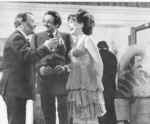
"I'm against actor knights too, 'cos I don't see how you can step on stage with them and give a performance. What about Richard Attenborough, CBE, you ask? Well, I'm past it now. I don't care anymore. And anyway, I'm taller than him." He laughed. "But, for instance, say you were acting with an A.K. who says to the producer 'Don't you think he's upstaging me a bit?' how can you reply 'Go and get stuffed, Sir'?
Top Spot
"I don't think actors should have anything to do with the direction of the companies they work for, either. I think the National Theatre company is pretty ordinary. There have been one or two good things and some marvellous performances, but most of the productions have been pretty poxy.
"Superb actors, certainly. Like Colin Blakeley and Bob Stephens. But actors should only act. Actors' responsibilities should be to the acting, the ensemble, and to each other as comrades. But if they have to work out policy or choose plays there must be a terrific temptation to say" 'Let's do Cyrano de Bergerac next year. It just happens I know it and have a big nose!"
Jimmy was born in his Gran's home in Croydon 37 years ago on December 19th. "I'm a Sagittarius, but I never dare look at the forecasts!" Then he went North.
He spent the first eight years of his life in Bridlington. His father was a Probation Officer, who suffered from wounds sustained in the First World War and finally died from them during the Second.
"We were fairly well off compared with our neighbours, because he was a professional man, and we always lived in a working class area. After my father died we moved from the East End to Southend
"I was a terrible scholar. A slight outsider. A rebel, if that's not too corny a thing to say. But I hated competition. School just seemed a place where for 52 weeks in the year you worried about what place you would get in class. And if I wasn't going to be first, I wasn't going to be second. So I opted out.
"I think competition is terrible. I'm all for the Comprehensive School system. Any child who is a bit sensitive or highly-strung but has a bright little mind suffers a lot. Once bombarded with pressures like arithmetic and grammar, they get kind of tight and reject it. My eldest daughter, Sarah, is bright, but she's not born to be an intellectual. She's in a class with 47 other kids. The top four or five will be all right whatever happens. But what about the rest? Being an actor's child she dreams a bit and shows off a bit, and doesn't learn as much as she should. How can she concentrate with all that screaming mob? So I am forced to move her to a private school where there are seven or eight in a class. I want all my kids to have the best education without the pressures of competition."
Jimmy's other children are Matthew James Edmund (5) ("He came around when I was playing Edmund in King Lear at Stratford-on-Avon"), Jason David (18 months) and Charlotte Alice (three months) and they live at Burnham Beeches with their mother Paula in a L20,000 house, bought when he thought he was all set as the ill-fated Robin Hood in Lionel Bart's Twang.
"I did Twang because it looked good. Lionel Bart was a friend of mine. Joan Littlewood was a friend of mine. It started off well, but it got worse and worse, and I was so far committed I couldn't leave it. There's a code which I still believe in in the theatre--that you stay with a show once you've promised.
"For four months I kept myself available for rehearsals. Then we rehearsed for four months. Then re-writing began. Then we played three months in the 'sticks', and it was being re-written all the time. People came and people went. Finally we played 10 weeks in town. A whole year with no money. I was on a percentage, and a percentage of nothing is nothing. By the time it collapsed after 14 months I was just known as 'that actor who'd been in Twang'. So nobody wanted to know. I was up to my eyeballs in debt with two mortgages on my new house and I literally had to beat the clock and the taxman every day for two years. I thought we'd all be out in the street.
"This was February, 1966. One night there was a terrible storm and it literally blew the roof off our old house in Penn. With the money I got from the insurance I paid off the taxman! The next few months were a panic. Then in July I was offered this three-year contract and said I'd take it if they'd cross my palm with a quick five thousand. So I was able to start paying off my mortgages.
Death's door
"In July last year Harold Robbins offered us the next-door villa to his in Cannes for six weeks. I went there a walking corpse with a vitamin deficiency and almost spitting blood, and I came back a new man.
"In the New Year things started happening. I began filming Robbery in January and then I was offered Mrs. Blossom.
"Ambrose Tuttle is the part every actor dreams about. He has fantasies every time he gets into a clinch with Shirley MacLaine that he's D'Artagnan or Romeo, and the film cuts to these sequences.
"Shirley is great. She's one of the three or four highest-paid female stars in the world, and she's used to the full treatment. She's just finished a film in Paris and the French are so courteous and there were armsfull of roses whenever she finished a day's shooting.
"I think she finds our rough-and-ready movie-makers a bit strange. It's not, 'Miss MacLaine, could you possibly move a little to the left?' it's 'Come down 'ere, Shirley'. But she takes it very well.
"I learn a lot from her. In films the art is to keep your face still and say the lines. Then everyone says, "What an interesting performance'. I'm inclined to twitch, then it goes out of the window.
"Now that I'm working again my only ambition is financial independence. Not to end up an aged skint old pro queuing at the Labour Exchange. But I don't know how one escapes. Actors get a bad deal. We have no protection. It's impossible to save with the present taxes even if you earn a huge amount. Everyone's complaining about old-age pensioners, yet they don't help you to put any by when you are earning."
It was time for him to have his moustache stuck on again. Before the gum set he managed a final bit of advice.
"My first day at RADA Sir Kenneth Barnes said to me--'The first thing an actor must have is resiliance.' Never was a truer word spoken When you think you're never going to work again, you've just got to hold on. Not take crummy bit parts. If you have ability, your turn comes round again. And if you're lucky, you get the right vehicle, and you're away again."
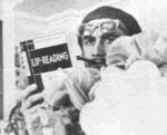
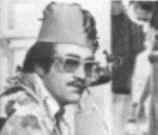
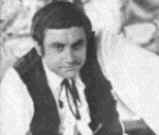
A few of the many masks donned by James Booth in The Bliss of Mrs. Blossom: badge-bearing hippy (left) togged out in a camouflaged combat jacket: Machiavellian spy-villain (top); cardboard cut-out Tommy Cooper (centre); and (above) suave Wyatt Earp type.